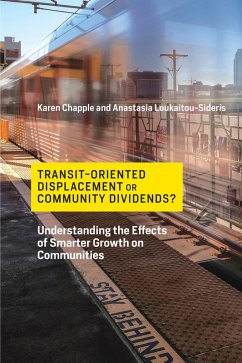Cities and regions throughout the world are encouraging smarter growth patterns and expanding their transit systems to accommodate this growth, reduce greenhouse gas emissions, and satisfy new demands for mobility and accessibility. Yet despite a burgeoning literature and various policy interventions in recent decades, we still understand little about what happens to neighborhoods and residents with the development of transit systems and the trend toward more compact cities. Research has failed to determine why some neighborhoods change both physically and socially while others do not, and how race and class shape change in the twenty-first-century context of growing inequality.
Drawing on novel methodological approaches, this book sheds new light on the question of who benefits and who loses from more compact development around new transit stations. Building on data at multiple levels, it connects quantitative analysis on regional patterns with qualitative research through interviews, field observations, and photographic documentation in twelve different California neighborhoods. From the local to the regional to the global, Chapple and Loukaitou-Sideris examine the phenomena of neighborhood transformation, gentrification, and displacement not only through an empirical lens but also from theoretical and historical perspectives.
Growing out of an in-depth research process that involved close collaboration with dozens of community groups, the book aims to respond to the needs of both advocates and policymakers for ideas that work in the trenches.
Dieser Download kann aus rechtlichen Gründen nur mit Rechnungsadresse in A, B, BG, CY, CZ, D, DK, EW, E, FIN, F, GR, HR, H, IRL, I, LT, L, LR, M, NL, PL, P, R, S, SLO, SK ausgeliefert werden.









